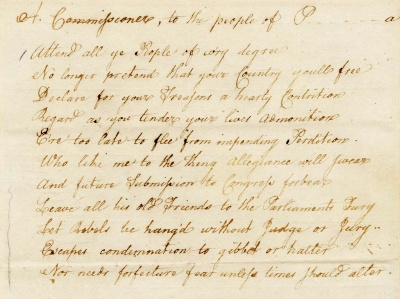"George Wythe Courts the Muses: In Which, to the Astonishment of Everyone, That Silent, Selfless Pedant Is Found to Have Had a Sense of Humor"

W. Edwin Hemphill, "George Wythe Courts the Muses," William and Mary Quarterly 3rd ser., 9, no. 3 (July 1952), 338-345.[1]
Article text, July 1952
Page 338
George Wythe Courts the Muses:
In Which, to the Astonishment of Everyone, That Silent, Selfless Pedant Is Found to Have Had a Sense of Humor
W. Edwin Hemphill*THE personality of a man can undergo an about-face as he grows older. The affable and extrovert may become silent and introvert. A serious outlook may replace lightheartedness. Gravity may supplant wit. Such a transformation seems to have occurred between the fiftieth and eightieth birthdays of George Wythe of Virginia.
Duringh his last fifteen years this solitary old man, then a widower for the second time, lived with three freed Negro servants in a modest frame building. He had no really near neighbor. His house stood on a lot which constituted a quarter of a partially vacant block in what is now the teeming heart of Richmond's downtown shopping area. When he died under peculiarly tragic circumstances on June 6, 1806, this mellow but uncommunicative octogenarian was survived by no closer kinsmen than the grandchildren of his sister. Only a few intimates had in recent years years enjoyed his friendship, though he was admired by all who knew him personally or were acquainted with his reputation.
Tolerantly, even affectionately, people told of his idiosyncrasies in which, they felt, he had earned the right to be indulged. They spoke of his habit of ushering into his equity court's office without so much as a word for those who called on business, of how he received courteously but with nothing other a knowing and reassuring air the papers concerning their cases, and of how they were dismissed silently but with what Henry Clay described late in his life as the courtliest bow he had ever seen. Wythe's wordless visit to a Richmond bakery to purchase each time a single loaf of bread and the daily ritual at his backyard well of his early morning sponge bath, for which he stripped to his waist even in the coldest winter weather—these and other eccentricities had become legendary. They gave him a Quaker-like reputation for simplicity and austerity.
* Mr. Hemphill is editor of Virginia Cavalcade and a member of the staff of the Virginia State Library.
Page 339
See also
References
- ↑ W. Edwin Hemphill, "George Wythe Courts the Muses: In Which, to the Astonishment of Everyone, That Silent, Selfless Pedant Is Found to Have Had a Sense of Humor," William and Mary Quarterly 3rd ser., 9, no. 3 (July 1952), 338-345.
External links
- Read these poems in the Internet Archive.